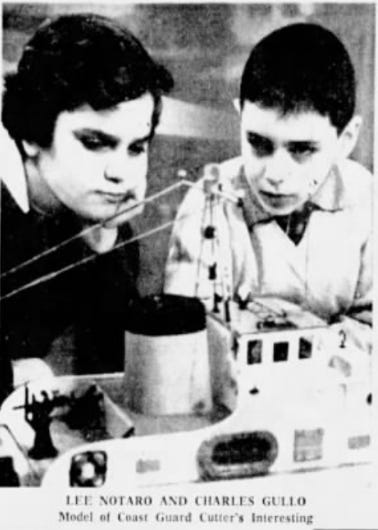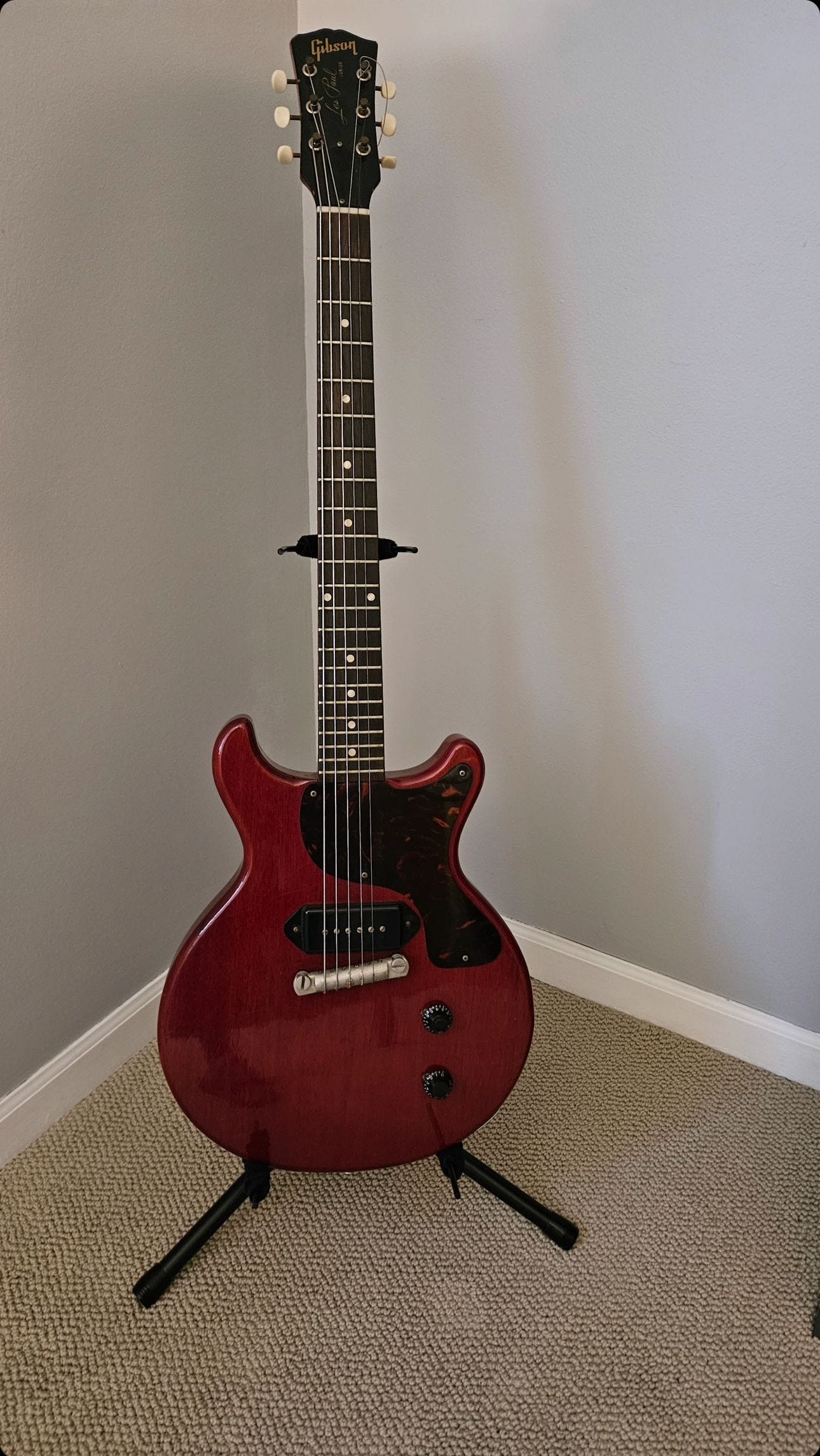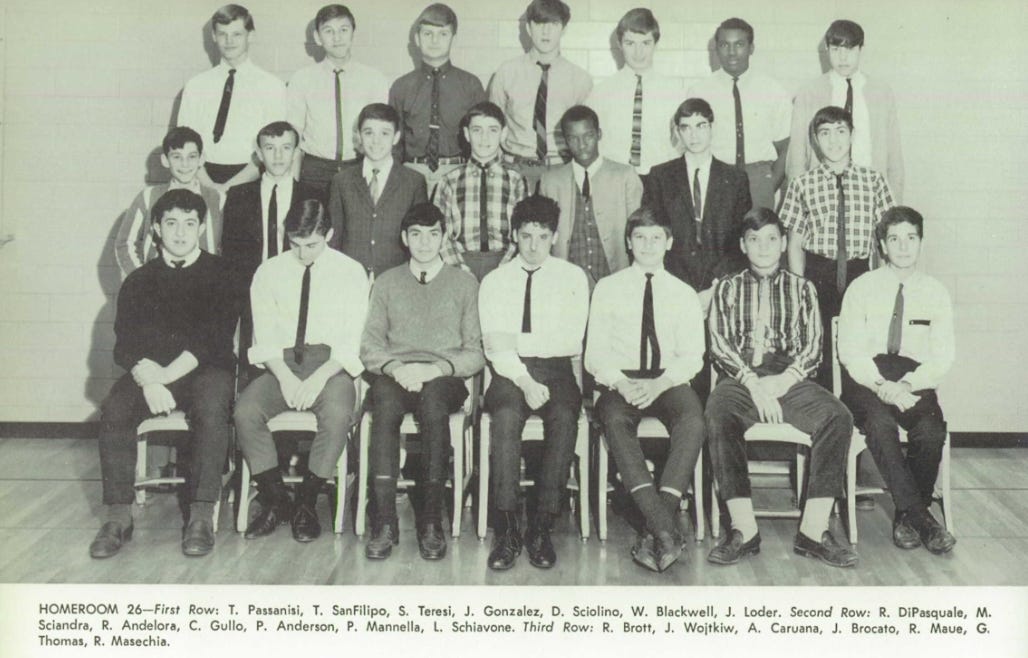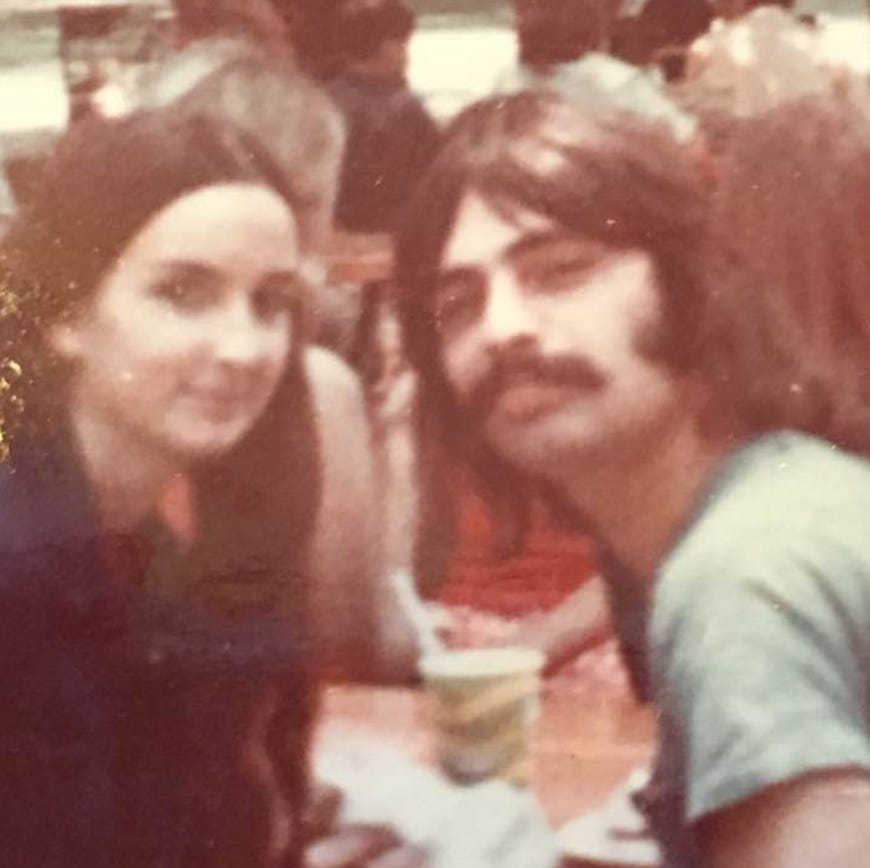September 22 would’ve been Chuckie Gullo’s 74th birthday. Should’ve been. But Chuckie died at just 24 years old in a complicated tragedy that made newspaper headlines in 1974.
It’s been almost 50 years since his death and now his nephew Frank is documenting Chuckie’s story… because Chuckie’s legacy is more than how he died. It’s how he lived.
Fellow Substack writer Frank Gullo hired me to help tell the story of his late uncle Chuckie. In his words, it’s “a family tragedy, a passed down heirloom, and silence that will be broken.” Frank knew little about his late uncle, as it had become almost taboo to discuss in his family. Even while interviewing Chuckie’s friends and family for this project, I discovered a mixed response. Some folks were reticent, while others were eager to share their memories. Some even questioned why we were digging up the past. From a handful of narratives, newspaper archives, and other genealogy sources, I’ve been able to piece together a snapshot of Chuckie’s life.
Known as Charles, Chuck, Charlie, and likely several other nicknames, Chuckie Gullo grew up on the lower west side of Buffalo, New York. Born September 22, 1950, Chuckie just missed an appearance in the 1950 census, where you’ll find his parents Carmela and Frank W. Gullo living at 205 Efner St with older brothers Joseph (“Joe”) and Dominic. Chuckie would call that address home for his entire childhood, anchoring him in a tight-knit Italian-American community.
Chuckie’s parents were in their early 40s when he was born and his older brothers Joe and Dominic were 15 and 11, respectively. That age gap likely played into the family dynamics. His niece Fran Werner says, “I know my grandmother just loved him to pieces. It was like he was her baby because she had him so late in life.” Joe would end up becoming a father figure to his youngest brother Chuckie as well. Joe’s daughter Carla says, “There was some combativeness between the two because I don't think my dad knew enough about parenting someone older because he was a new parent himself.”
At just eight years old, Chuckie graced the front page of the Buffalo Evening News: Chuck, 8, Sees Boat He Likes; It’s Just a 95-Foot Cutter
Reporter Jack Horrigan wrote:
A model of the 95-foot Untied States Coast Guard cutter CG 95304 caught the fancy of 8-year-old Charles (Chuck) Gullo of 205 Efner St. He toured its main deck with an inquisitive eye. The model is among the displays at the fourth annual Buffalo Boat, Travel & Sports Show in the Connecticut St. Armory. The show opened today at 2 o’clock. It runs for the next nine days with the closing hour at 10:30 PM. As young Chuck completed his inspection of the ship model, he turned to an adult standing nearby. ‘Say, is there a boat around here like the SS Constitution?’ His eyes widened in hopeful anticipation as he spoke.
Interests Dad, Too
The reply, naturally, was negative. Still, it didn’t dull his enthusiasm. ‘I thought Dad would like to see a ship like that,’ he grinned. Chuck saw plenty to interest himself - and Dad as well. The adjoining display always seemed to have a greater appeal than the one he was excitedly viewing. What caught his eye - and those of the youngsters touring the aisles? Boats, $200,000 worth. From model canoes to power runabouts and cruisers. Camping equipment. From a bed roll to cartop and training tenting unit. The effect of television was apparent, too. The small fry quickly recognized the equipment of the skin-diver.
Source: The Buffalo News; Sat, Feb 21, 1959
This simple article gives insight to Chuckie’s personality as a child: inquisitive, adventurous, and generous. His childhood friend Michael Roy says, “He had a good heart.”
Roy attended a public grammar school while Gullo attended Holy Cross Grammar School, a Catholic school across the street. The pair met under less-than-ideal circumstances, yet quickly formed an enduring friendship.
“I was outside playing a little football with the guys in my neighborhood in the street,” recalls Roy, “and Chuckie came by on his bicycle and I had thrown a ball to one of my friends and he missed it and the ball bounced and it bounced towards Chuck on the bicycle. So he gets off and picks the ball up. He comes back and like a wise guy says, ‘Did you throw that at me on purpose?’ Right away. I was like, who's this guy? I had no idea who he was and just being the wise guy, just that we all were on the west side. I said, ‘Yeah, I threw that at you.’ So he whooped the ball at me and hit me with it. And the fight was on, the long and short of it. That was the first time we met. Second time we met was in the playground at the grammar school, going to try out for base softball, and he was there and he started with me again and we fought again. But then after that, I mean, I don't know what happened. We became the best buddies. We became the best friends after that. He used to come over to my house with his guitar. We both played guitar. He'd come over, we'd show each other a couple things back in the Beatles days and that kind of thing. And it was a lot of fun.”
Their shared love of music bonded them. “We shared our music at my house. He’d come over to my house with his guitar. He had a really nice Gibson guitar, but he didn't have a case for it. And he would walk around the neighborhood with his guitar. Now you really need to get a case for that thing. Something's going to happen to it. It was a very nice guitar.” Roy says that Chuckie was a mediocre guitar player, but he remembers when they were learning “Louie Louie” by Kingsman, Chuckie was able to play it verbatim, note by note. “He was really proud of that and he loved to play it.” Roy also recalls the day that they learned how to play “Gloria.” “He came running into my house. ‘I got to show you this, I got Gloria!’ and he was sitting down in my living room and I pulled up my guitar. We sat there and he taught me Gloria, he taught me the chords to Gloria almost immediately. And that was a big one for him. He enjoyed that.”
That guitar was eventually passed down to Chuckie’s nephew Frank, who still has it today.
In addition to music, Chuckie was also active in self-defense training. “He took me to a place on Connecticut [Street] where he performed, or he was learning karate,” recalls his niece Carla. “As a child, it was very impressive to me because he was earning a belt and that was something that was important to him.”
“He had a lot of pretty girls always at my grandmother's house,” says Carla. “I remember if he wanted to get rid of me, he would give me money to get him something. At the time, you can buy cigarettes for people and then I can get something for myself. So I knew that was the sign to go away and to disappear because I was his shadow.” She describes him as having a giving nature and a loving attitude. “He always felt a little protective and wanted to give me things that my parents wouldn't give me. I think part of it might've been his rebellious spirit. He wanted to channel that to me in some way. He bought me my first clogs where my dad never let me, that was the fashion back then.”
Gullo started attending Grover Cleveland High School in Buffalo in 1965.
In his sophomore year, Chuckie was part of the chorus.
During the summers, Gullo and Roy worked for an ice cream truck business called Charlie’s Super Cone. “We would go through the neighborhoods with that music playing that would go through your head while you were sleeping. It was non-stop. And we would do soft serve ice cream, we'd make cones and we'd make our banana splits and ice cream sundaes and milkshakes and that kind of thing. And we had such a good time doing that because all the girls our age would come to the truck and we’d get to meet all the girls. We had it made! It was great.” When Chuckie stopped working there, his young cousin Joe asked why and was told that Chuckie gave away too much ice cream for free.
Outside of school, Gullo and Roy participated in Beta Phi, a high school fraternity. “They really didn't amount much more than jacket gangs,” says Roy. “I mean, we all had our Greek letters on our jackets.” He described the jackets as blue with white trim and they had Beta Phi, B with the Phi as an I with the circle in it.
While they were in Beta Phi, they would host dances for the local teenagers at Bowlmore, a former bowling alley that also had an event space.
“There was a place that was on Niagara Street that was called the Bowlmore. And the bowling alleys really were shut down. They didn't use them, but there was a lounge downstairs. And then upstairs there was a place where you could have a party,” Roy remembers. “Some nefarious card games used to go on up there with older men, with the older Italian men in the neighborhood. And we used to run coffee for those guys or snacks, and they would tip us.” The operator of the Bowlmore Lounge, Rudolph Battaglia, would be arrested in 1970 for his gambling operation. [Source: The Buffalo News; Thu, Oct 01, 1970]
“And then we talked our way into them letting us run our dances. We'd have a dance, hire a band, we'd hire a couple off duty cops, and we'd throw a Friday night dance for the teenagers,” recalls Roy. “They came from all over the city to go. We never lost money on that. We were able to pay the cops and pay whatever band we hired and still make a profit.”
In addition to the dances, Roy described how life on the west side of Buffalo at that time was full of fights. It was a way of life. He recalls one night when they went to a pizza place on Homewood Avenue. “Charlie had, I don't know why he had this jacket on, but he had this jacket on that was sort of from a fraternity that had kind of a bad reputation. And we walked in there, he had the jacket on, which was their colors, but the letters weren't on it. It didn't say that was the fraternity… They all looked when Charlie walked in with that jacket. But he had a lot of nerves... And I thought he was crazy. But I walked in there with him and believe me, I'm no bigger than Charlie. We're both the same size, and we sit down and we're getting stared at and I'm a little uncomfortable. And then some few wise cracks said, hey, who wants a jacket? They were going to take the jacket off of Charlie. I, like an idiot, stood up and said, who's going to take it? We were outnumbered. I mean, what an idiot I was. I mean, he was an idiot for walking in, but I was an idiot for opening in my mouth. We luckily got out of there with our lives and the jacket.”
One of Gullo’s younger cousins, Joe, recalled how he was bullied often until he called on Chuckie to help take care of it. After that was resolved, Chuckie asked Joe to borrow his car and Chuckie returned it “smashed up.” In spite of leaving Joe with the repair bill, Joe loved his cousin fiercely.
Gullo’s adventures also included crossing international borders with his friend Michael Roy. They lived “a stone’s throw” from the Canadian border and it was easy for juveniles to cross at that time. “We would go through customs and they’d say, where are you going? And we'd tell 'em, going over, going swimming over at the Baby Hole. There was a place over there called the Baby Hole, or we're going up to Sunny Acres for horseback riding or Crystal Beach to go to the amusement park. They didn't care. And that's the way it was back then,” says Roy. The pair would sometimes get into some mischief, like smuggling fireworks across the border. Since the explosives were illegal in New York, they’d buy some in Canada, drop them off the side of a bridge before going back through customs, then pick them back up on the other side of the border.
Chuckie’s senior year of high school, 1968, was a tumultuous time in U.S. history. The Grover Cleveland High School yearbook captures the experience of its senior class… and foreshadows the remaining years of Chuckie’s life.
“War. Crime. Riots. Death. These are the headlines we read daily. These are some of the problems we shall face when we awake tomorrow morning. This is reality. Is it the consciousness of yesterday, the awareness of the changing times of today and the forthcoming events of tomorrow. Here on commencement night we are faced not with the past, but with the present and the future.
In high school, we thought the problems of war and death unreal and unimportant. Throughout our career at Grover we have been protected from these matters by our teachers and our parents. But as we leave high school, and embark on our own, these situations shall become a vital part of us. To the apathetic individual the problems confronting today’s society may seem trivial and few, but to us, the graduates, the racial riots, the protest marches, the draft-card burnings, the increase in crime, and the indifferent American will affect our very lives. We must base our decisions on the experience of the past, the reality of the present and the hopes for the future.”
“Ambition: To be a playboy millionaire.”
Chuckie would not graduate that year and was arrested in June.
Pair Charged in Beating Of West Side Youth
Two youths were charged with third-degree assault in a gang beating of Salvatore Teresi, 17, of 1045 Niagara St., while he was walking with Gloria Picone of 431 Seventh St., in Forest near Claremont Aves. late Saturday. The pair was identified as Ward D. Keller, 18, of 220 Potomac Ave., and Charles Gullo, 17, of 205 Efner St.
Source: The Buffalo News; Mon, Jun 03, 1968
Three months later, Gullo enlisted in the U.S. Navy. He would serve as a Seaman Recruit until he was discharged in July 1969.
Source: U.S., Headstone Applications for Military Veterans, 1861-1985
1969 would serve as a somber milestone, as Chuckie’s father passed away fourth months after he left the Navy. That loss left a big impact on the family and changed the family dynamics. “He [Chuckie’s father] wasn't a huge disciplinarian, but then it made the responsibility shift to the other brothers. So I think in that way there might've been more of a respect because my uncle might've been more, I guess, cooperative because he knew that the spirit of his father was different than the spirit of his brothers. Maybe there was more loyalty there. My grandmother was ahead of her time. I think in terms of being a dynamic or renaissance woman, she worked, she, she seemed more the disciplinarian than my grandfather. It's not that she wasn't gentle. She was definitely gentle and loving, but she had a firm sense of discipline and just a handle on all of the people. She was very social, where my grandfather was a little bit more quiet. Just remember him being very gentle.”
The stories and records of Gullo’s life from that point until his death in 1974 are sparse. One of his younger cousins, who asked not to be named, recalls living with him in Philadelphia, where Gullo worked at American Express for a while, possibly in Sales.
Gullo moved to Fort Lauderdale, Florida in the early 1970s and the stories from his time there are few and mostly unspoken.
Gullo’s niece, Fran Werner, recalled that he had a fiance at the time of his passing, but wasn’t sure of her name. She also says that Gullo was working for his fiance’s father. Another niece, Carla Catalano, recalled him having a serious girlfriend named Sandy. And a cousin remembered a woman named Sue being his girlfriend in Florida, but that there was no engagement.
“When I came to Florida as a young cousin, he brought me in with the guys he lived with and listening to them play music, going into the park and play music and just being those days, that's what you did.” He recalled Chuckie playing in a band called the Tony Curella Five, or TC5.
“1 Killed, 6 Seized in Hallandale Narcotics Trap”
That was the headline in the Fort Lauderdale News on December 6, 1974, announcing the death of Chuckie Gullo.
Federal narcotics agents killed one man and arrested six other persons during an alleged drug transaction last night in the parking lot of Pumpernik’s restaurant, 917 E. Hallandale Beach Blvd. Charles Gullo, 24, of 3709 Longfellow Circle, Hollywood, was shot to death as he allegedly tried to run down three Drug Enforcement Administration officers with his 1973 Cadillac. Police said the vehicle continued south through the parking lot, crossed the boulevard and smashed into a lamp post at the entrance of the Sage Shopping Center, about 100 feet away. Eight members of the DEA’s Miami Task Force watched as two undercover agents purchased a pound of white powder believed to be cocaine. Gullo and three other alleged dealers had arrived in three different cards, apparently hoping to confuse any police in the area. When Gullo finally removed the alleged narcotic from the trunk of his car, the agents moved in. Gullo allegedly jumped into his vehicle and wheeled toward three agents, who said they shot at least four times. Police said a loaded revolver was found in the front seat of the crashed car near Gullo, who was pronounced dead at Golden Isles Hospital at 9 p.m.
The Miami Herald provided more details of the tragedy in a December 7 article:
Gullo was sitting in the driver’s seat of his 1973 white Cadillac, and suddenly reached down between his legs, simultaneously gunning the car forward. A revolver was found on the seat beside him. Three agents opened fire. Gullo was struck in the head and lost control of the car which sped out of the parking lot, south across Hallandale Beach Boulevard, jumping a curb and the grass median strip and coming to rest against a lamp post in front of the Sage Shopping Center. At least two bullets reportedly struck the car in addition to the one which hit Gullo, police said.
The Fort Lauderdale News would report on December 19 that Gullo was named as a conspirator in the incident, but was not indicted.
The tragic news reached Chuckie’s hometown via obituary in the Buffalo News:
GULLO - Charles J.
Of Buffalo, N.Y., Dec 5, 1974, son of Carmela (nee D’Auria) and the late Frank (Whitey) Gullo; brother of Joseph (Diana) and Dominic (Josephine) Gullo. Friends may call at the Joseph Spano and Sons Funeral Home Inc., 473 Niagara St., near Hudson, where funeral will be held Wednesday morning at 8:15 and in Holy Cross Church at 9 o’clocl. Family will be present from 2-5 and 7-9 P.M. Flowers gratefully declined.
Chuckie’s niece Carla remembered that her dad tried to shield her from what happened, but that her grandmother was more open to it, sharing a newspaper article about his death. She recalls her uncle Dominic being silent and how her dad was “not consolable.”
“His funeral was very traumatic,” recalls Chuckie’s friend Michael Roy. “It was awful. I was a pallbearer. His family had cigarette lighters engraved with the funeral date and all that. They gave the lighters to the pallbearers. I still have mine.”
Roy wants Gullo to be remembered as “a fun loving guy who had illusions of grandeur. Like he said, a Playboy millionaire. That's pretty much what he was striving for. He was a small town guy. Buffalo wasn't a big town, and he got himself involved where he probably should not, he shouldn't have been what he going to do.”
One of his cousins described him as a fearless tough guy. “He didn't start fights, but if you started a fight with him, you're going to get in a fight.”
Fran Werner’s impression of Gullo was that “he just seemed like an average happy kid who grew up and just kind of got himself caught up in some things that he probably wished he didn't. If he could go back in hindsight. And I don't know that he did anything really bad or anything exceptionally good, except he was a good kid.”
Why tell Chuckie’s story? And why now? Those are some of the questions posed to me while I was interviewing Chuckie’s friends and family.
His nephew Frank, who started this project, is the owner of one of Chuckie’s prized possessions, his guitar. But Frank never knew much about his late uncle. As the guitar came back into the picture during a house remodeling project, it was as if a piece of Chuckie’s legacy came out of hibernation as well. Frank’s friend Travis restrung the guitar and in a sense, brought it back to life. Frank began to reflect on his uncle Chuckie’s life, and how little he knew, around the same time that Kinfolks launched. Throughout his life, Frank has felt an almost spiritual connection to his uncle, that Chuckie not only represents a missing piece of his family… but also of himself. He feels a special kinship to Chuckie’s rebellious spirit that he hasn’t experienced in the rest of his family. Frank has kept Chuckie’s memory close over the years, remembering him often and honoring him on his birthday annually. He also wants to make sure his relatives’ stories are captured for posterity.
“I think it's important for me to tell their stories,” says Frank of his relatives. “it's just increasingly evident that if I don't do it, no one will.”
Understanding who came before us in our family helps inform our identity. And if we only rely on documents like birth and death records, we can miss the character of a person. Documenting oral history, like the stories shared by Chuckie’s friends and family, helps paint a fuller picture of our ancestors. And breaking the silence that can arise after a tragedy can be theraputic as well.
May Chuckie Gullo rest in harmonious peace with the comfort of being well-loved by his family and friends.
















Tough to write. Thank you telling the story.
Nicole - thank you for crafting a difficult retelling with authenticity, perspective, and tenderness. I'll be sharing more on my own Substack, but I wanted to comment here to thank you and all Kinfolks readers who took time to learn about Chuckie and his story. I'm also happy to share that Chuckie's vintage Gibson guitar 🎸 was played again, as part of an onstage concert befitting I think his spirit. https://frankgullo.substack.com/p/buffalodown-only-human-recap